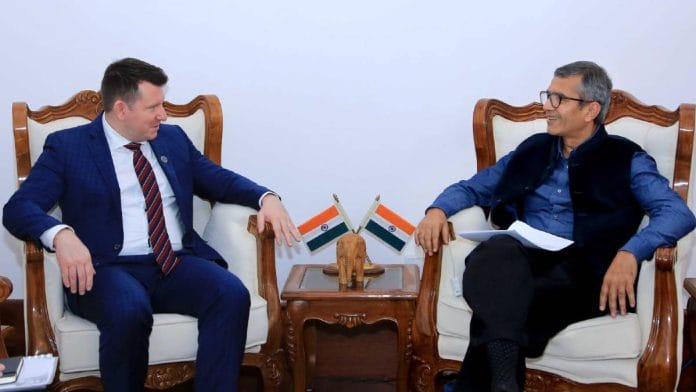New Delhi: Estonia is looking to collaborate with Indian companies in defence production as the European Union (EU) is looking to ramp up military spending in the next few years, said Jonatan Vseviov, Secretary General of Estonia’s Ministry of Foreign Affairs, in an exclusive interview with ThePrint Tuesday.
“Nowadays, as Europe is spending more on defence, we’re all obviously ramping up our own defence industries. India has been doing the same, a growing defence industry you have here in India. So, already today, a number of Estonian defence industry companies are interested in not just the Indian market, but in collaborating with India’s companies. Also, India’s companies are interested in Estonia,” said Vseviov, on the sidelines of Raisina Dialogue in New Delhi.
“When interacting with Estonia, you’re not just interacting with Estonia, you’re interacting with one of the largest markets in the world, the European Union, in an internal market,” asserted the Estonian Secretary General (equivalent to foreign secretary).
During his visit to New Delhi, Vseviov met with India’s Defence Secretary Rajesh Kumar Singh Tuesday and discussed collaboration in cyber security, defence industrial production, military training and niche technologies.
Estonia is looking to increase its defence spending to at least 5 percent of its gross domestic product (GDP) from 2026, as the EU member-states are looking to ramp up their military budgets following the churn in global politics due to the US breaking away from the transatlantic partnership.
US President Donald Trump has increasingly opened talks with Russian President Vladimir Putin, with the two countries last month voting against a United Nations General Assembly resolution backed by European countries, condemning Moscow for its war with Ukraine.
Trump has also called on EU states to spend more on their own defence, as Washington looks to recalibrate its security policy away from Europe and towards the Indo-Pacific. As a result of this, the EU earlier this month, at a special summit of its leaders, agreed to spend more on its military.
European Commission President Ursula von der Leyen unveiled a plan to “ReArm Europe”, which could potentially see up to 800 billion euro increase in defence spending over the next four years, including a 150-billion-euro defence fund for the EU member-states.
India’s voice matters
Vseviov highlighted the importance of India’s voice in supporting peace in the Russia-Ukraine conflict, saying that much of the world is looking towards New Delhi as its “representative” on the global stage.
“The voice of countries matters and the voice of India matters in particular. Much of the world is looking at India as a representative, unofficially speaking, of their aspirations, of their frustrations. I can tell you as a representative of a small country, we were frustrated by the 20th century,” he said.
“Estonia alongside Lithuania and Latvia were the only three members of the League of Nations that did not become founding members of the United Nations, because when the lights came back on in Europe, we had been wiped off the map of Europe. We had been destroyed, annexed illegally into the Soviet Union. So, we understand that there is a major difference between peace and peace, just peace and unjust peace,” he added.
At the end of World War I, following the collapse of the Russian Empire, Estonia declared independence and fought a two-year war of independence. From 1920 till 1940, the country remained independent, before it was annexed by the Soviet Union in the midst of World War II. By the end of the war, the country, which was also occupied by Germany for a few years during the war, returned to Soviet control. In 1991, after the fall of the Soviet Union, Estonia once again declared independence and has since become a member of the EU.
“India’s passion when it comes to territorial integrity and sovereignty, when it comes to a predictable, stable and international law-based system, is just as strong as Estonia’s. So, my hope is that we can cooperate on these political topics as well, that we can see more forceful voices defending territorial integrity and sovereignty around the world, and that India demonstrates a leadership role in this regard,” said Vseviov.
EU commissioners’ visit to India a ‘message’
The Estonian Secretary General highlighted the visit by the College (Cabinet) of Commissioners of the European Union to New Delhi last month. The delegation led by von der Leyen included 21 commissioners.
“I do hope people here understand that while it’s quite natural for the Commission President or individual commissioners to travel internationally, it is quite unusual for the Commission President to take the whole commission with her. Hopefully, people here understand that this is us sending a message, sending a message of the strategic importance that we attach to the relationship that we have with India,” said Vseviov.
He further said that Estonia will “do everything that we can to facilitate” the Free Trade Agreement (FTA) under negotiation between India and the EU. Talks for the deal had begun in 2022 but were paused last year due to elections in both India and the EU. The negotiations have begun again, following von der Leyen’s visit to India, with both sides targeting to complete the deal by this year.
However, a number of sticking points remain in the FTA, including India’s tariffs on automobiles and liquor products. It remains to be seen whether the deal can be finalised by the year-end.
“I would, as a citizen of Europe, advise the citizens of India to interpret the Commission’s visit as a signal, as strong as you can get from Europe, of the ambitious nature with which the Commission approaches the free trade agreement issue with India,” said Vseviov.
(Edited by Nida Fatima Siddiqui)
Also Read: Progress on India-EU FTA ‘marginal’, Piyush Goyal points to ‘irrational standards’ set by bloc






